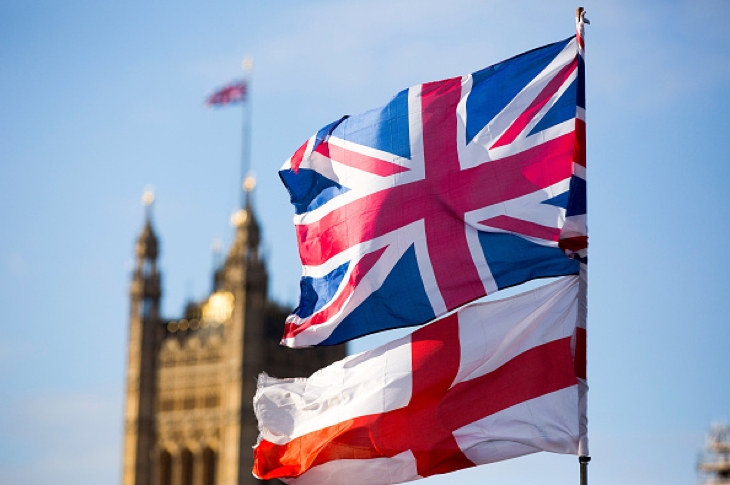We’ve been filling in our son’s school application form this week. Below his name, date of birth and gender – which I’m horrified to see only has two options, despite the form clearly stating that it is indeed 2017 – is ‘ethnicity’. I suppose I’m meant to put ‘White British’ although I dislike the phrase. Nine-times out of ten when I see the W-word used in the media it’s as an insult or gripe, usually followed by ‘privilege’ or – shudder -‘feminist’.
Of course, there’s another term we could use instead: English. According to the Guardian: ‘English patriotism is on the rise at the expense of a sense of British identity, with voters in England increasingly likely to describe themselves as solely English, according to research.’ The study found that almost a fifth of people describe themselves as English not British, up 5 per cent from 2015, with more than a third of those surveyed describing themselves as either solely English or more English than British. The YouGov data showed that the number of people who described themselves solely as British fell in 2016 from a year earlier. Last year just 18 per cent of those surveyed said they felt only British or more British than English.
The decline of Britishness directly goes hand-in-hand with its transformation into an ideology, complete with a set of values attached. Military empires are often followed by spiritual empires after the initial political entity collapses. The Assyrians, for example, still projected huge influence through what westerners called the ‘Nestorian Church’, spreading the faith (and Assyrian culture) as far as China.
The fall of Rome was followed by the rise of Roman Catholicism, which preserved and projected Italian culture among what Petrarch called ‘the uncouth races’ (that’s us). Likewise the British Empire died but its ghost echoes in the cult of Britishness, a sort of multicultural vision of the world in which London is the new Vatican and ‘British values’ are projected through Foreign Office schemes to combat homophobia in the former empire (homophobia which we enshrined into their legal systems). The 2012 Olympic opening ceremony was the epitome of ‘British values’. Likewise the NHS, which is the British Empire in miniature (although not that miniature, in terms of numbers), is another; it even attracts a cult-like devotion among supporters who can only see healthcare in Manichean terms, the British v American models. ‘British values’ increasingly refers to a set of left-liberal tenets, not all of which many of us agree with.
Because Britishness has never been articulated as being especially racial, it’s relatively easy for anyone to identify as such. As Sir Bernard Crick, designer of Britain’s ‘citizenship curriculum’ put it, ‘to the immigrant, Britishness is essentially a legal and political structure… When the immigrant says I am British, he is not saying he wants to be English or Scottish or Welsh.’
But, as Britishness has become increasingly open to all, decreasing numbers of white British people have identified as such. Polls in 2007 suggested that 51 per cent of ethnic minority members considered themselves British first, but only 29 per cent of whites now did, as opposed to 52 per cent who considered themselves as primarily English (something only 11 per cent of non-whites identify as). That trend seems to have increased since then, so that in 2011, just 14 per cent of white Britons identified as British first, compared to 64 per cent identifying as English.
The rise of English identity may be a reaction to the de-racialising of Britishness, which instead now has an almost ideological meaning. Making Britishness more of an open identity was perhaps necessary as society changed, but it has probably weakened it and with it the union.
Unsurprisingly, then, identifying as English strongly correlated with voting Leave, with some 72 per cent of those who see themselves as English choosing to take control, compared to just 43 per cent who identify as British. (The opposite is true in Wales, where people who identify as Welsh over British were more likely to vote Remain.)
As part of the same process Englishness has also become proletarianised. The St George’s Cross, which outside of Anglican churches was almost unknown before 1996 (I would bet a large proportion of the population would not even have been able to identify it), is about the most déclassé symbol there is.
Personally I’ve always used the terms British and English interchangeably, which I know is maddening, but England has more poetic resonance: there is some corner of a foreign field that is forever the United Kingdom etc. Maybe Britishness will be killed off by the anomie of filling in forms; that, and endless government missions to promote ‘British values’, or debates about what it all means. Confusion is tiring, and Englishness is less complicated. In fact it’s all there in the gift my son received on the day of his Christening, the complete works of Shakespeare. Everything else is commentary.







Comments